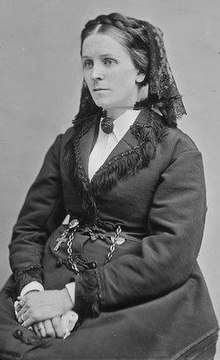Charlotte Denman Lozier
Charlotte Denman Lozier (March 15, 1844 – January 3, 1870)[1] was one of the first female physicians in the United States. She worked as a professor, as a feminist campaigning for women's rights, and as a homeopathic physician.[2] She was also a mother to three and spent much of her early childhood traveling around the United States with her family.
Charlotte Denman Lozier | |
|---|---|
 Dr. Charlotte Denman Lozier | |
| Born | Charlotte Denman March 15, 1844 Milburn, New Jersey |
| Died | January 3, 1870 (aged 25) |
| Nationality | American |
| Alma mater | New York Medical College for Women |
| Occupation | Physician, Suffragist |
| Spouse(s) | Abraham Witton Lozier ( m. 1866) |
Early life
She was the daughter of Selina and Jacob Denman.[3] Lozier was the oldest of five. Lozier was born in Milburn, New Jersey, in the Eastern United States. The Denman family travelled to Napoleon, Michigan in 1850 and later to Galena, Illinois in hopes of exploring the frontier.[3] The Denman family finally travelled west to Winona, Minnesota in 1852.[4] Charlotte's mother, Selina Denman, passed away when Charlotte Denman Lozier was in her teens, and Charlotte became a caretaker for her family. Charlotte contributed to her family by teaching.[3]
Education
In 1864, Charlotte Denman Lozier, 20 years of age, moved back east to New York to pursue a medical degree.[1] Charlotte began her medical career by entering the New York Medical College for Women.[4] New York Medical College for Women was the first medical school for women in the state of New York and opened the year before Charlotte Denman Lozier entered the school. New York Medical College for Women was founded by her mother-in-law, Dr. Clemence Sophia Harned Lozier.[3]
Early adulthood
Dr. Charlotte Denman Lozier finished medical school in 1867 and soon became a professor of physiology and hygiene for New York Medical College for Women.[3] While working as a professor, Charlotte also presented many lectures on women's rights.
Charlotte Denman Lozier married the son of Dr. Clemence Lozier, Dr. Abraham Witton Lozier on January 20, 1866 in Ft. Wayne, Indiana.[1] The two remained in Winona for some time before returning to New York where Charlotte then became the Vice President of the National Working Women's Association.[1] As a feminist, she campaigned for the Women's Suffrage and Working Women's Association as well as other progressive and charitable organizations.
Charlotte Denman Lozier and Abraham Lozier had three children. The first born was a boy, Clement Abraham on November 7, 1866. Clement Abraham died at the age of 21.[5] The next to be born was another boy, Robert Ten Eyck, in May 1868 in Connecticut while Dr. Charlotte Denman Lozier was on her way home from a lecture.[1] The last to be born was a girl, Jessie Charlotte, born on January 1, 1870.[5] Jessie Charlotte married Harry S. Payne on January 15, 1896. Jessie and Harry Payne had one son born on July 3, 1898, named Robert Lozier Payne.[5]
Career
Lozier worked as a physician, lecturer, and belonged to Sorosis, which in Latin means sisterhood. Sorosis was a professional women's club, which sought to support women involved in various fields of work.[6]
Lozier also served as the first Vice President of the National Working Women's Association. The Working Women's Association was created in 1868 and was formed to protect the rights of women, including better labor conditions for women of all classes.[1]
In the late 1860s, Charlotte Denman Lozier defended Hester Vaughn, a woman accused of killing her newborn. Lozier was also well known for defending women such as Caroline Fuller, a young woman whose sexual partner was urging for an abortion.[3]
The Charlotte Lozier Institute, named for Lozier, is an anti-abortion think tank founded in 2011. It is a research and education arm of the Susan B. Anthony List, an organization dedicated to electing candidates and pursuing policies that will reduce and ultimately end abortion. The stated goal of the Charlotte Lozier Institute is "to promote deeper public understanding of the value of human life, motherhood, and fatherhood, and to identify policies and practices that will protect life and serve both women’s health and family well-being."[7]
Last years of life
In 1869, Charlotte was pregnant with her third child. On New Year's Eve, Charlotte was on a ladder hanging a curtain when she became light-headed and fell off of the ladder. Charlotte Denman Lozier was taken to the hospital where her third and final child was born two months prematurely. However, Charlotte passed away at age 25 on January 3, 1870.[1] Lozier died from health complications surrounding the pregnancy and birth of her third child, who was born several days before she died. She was survived by this child, her two previous children, and her husband.
References
- "Dr. Charlotte Denman Lozier - Notable Women Ancestors". www.rootsweb.ancestry.com. Retrieved 2017-10-10.
- Kirschmann, Anne Taylor (2003). A Vital Force: Women in American Homeopathy. Rutgers University Press. ISBN 9780813533209.
- "Charlotte Denman Lozier | History Of American Women". History of American Women. 2017.
- MacNair, Rachel M. (2006-01-20). ProLife Feminism: Yesterday and Today. Xlibris Corporation. ISBN 9781477173053.
- Harris, Harriet Newell (1913). Denman family history: from the earliest authentic records down to the present time. Glendale News. p. 66.
- "Sorosis: Sisterhood is Powerful | Feminists for Life". www.feministsforlife.org. Retrieved 2017-11-30.
- "About Us | Charlotte Lozier Institute". lozierinstitute.org. Retrieved 2017-12-01.
- Hume, Janice (2000). Obituaries in American Culture. University Press of Mississippi. p. 82.
- Herald of Health obituary
- New York Times obituary